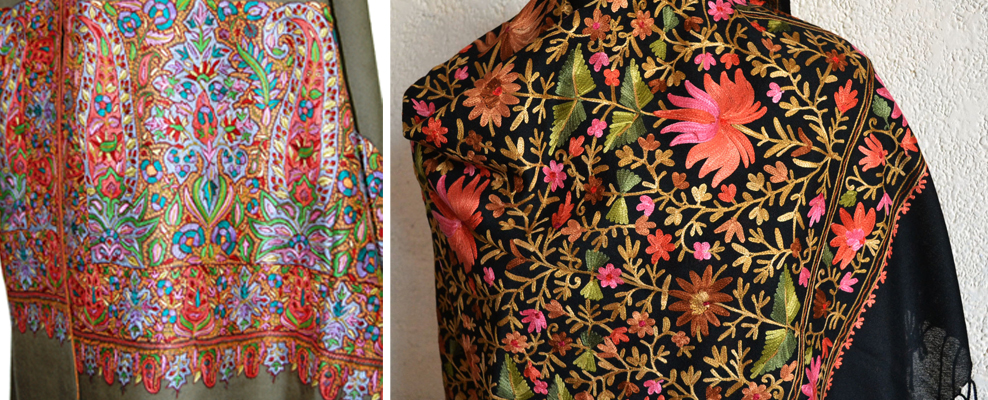Some 200 kms off Delhi in western Uttar Pradesh is the sleepy town of Najibabad. Founded in the 1740s by Nawab Najib-ud-Daula, a Rohilla Afghan noble, serving in the Mughal army this dusty UP town, is the hub of the exquisite Pashmina Kani shawl trade.
The Pashmina Jamewar – as the Kani shawls are known – traveled to Najibabad from its valley in the heart of Kashmir, and is the typical example of the role textiles play in shifting cultures. It is likely that strife in the upper region of the valley towards Lahore and Karachi shifted the commerce towards the Gangetic plains and introduced the rafoogars into the Rohilla country some 250 years ago.
The rafoogars migrated to the Kashmir valley from Samarkand and Iran. Deft darners, they would go from door-to-door darning old shawls so skillfully that it was almost invisible to the naked eye. Overtime they became expert embroiders and the delicate and famous sojni embroidery was born. (The rafoogars are the original sojnikars of Kashmir who wove the famous dorukha jamewars, reversible shawls, of Emperor Akbars’ court). Unfortunately along with their invisible repair, they too have remained invisible to the world at large.
Overtime the Roofagars built a considerable collection of antique Jamewar acquired cheap as ‘rejects’, unfit for further use which they would mend with their invisible darning skills restoring these priceless, tattered, discarded rags, to rich shawls once again to sell them to connoisseurs and collectors.

But by the end of the 19th century the thriving jamewar shawl industry gradually declined and could never be revived as the socio-economic structure had changed too much to make their production viable. It is at this point in textile history that the skills of the roofagars become significant; keeping these exquisite pieces alive and rescuing a substantial number of these priceless textile from extinction. With the death of the jamewar, the shawlwalas – as the rafoogars came to be known, had to find alternative means of livelihood. Subsequently the birth of the Najibabad shawls. About 20 to 25 years ago, 100-odd families started making these fine amlikars or embroidered copies of the exquisite antique shawls based on Mughal motifs from the Dogra period of Kashmir history.
Come spring, the shawlwalas head to Kashmir where they buy bales of undyed pashmina, which over the summer, they dye and embroider into exquisite and colorful shawls. Three types of shawls are produced here, papier-mâché, kalam kari and resham tana.
The papier-mâché shawls depict the typical colorful papier-mâché motifs of Kashmir. The designs are first printed and then embroidered. These types of shawls are mainly collage of woven panels, borders, and embroidered fringes deftly sewn together, so perfect that it is almost invisible and has to be flipped over and seen against the light to locate the joinery.
The kalam kari shawls evolved later, the designs and motifs are first printed on these shawls and herbal colors are applied with long bamboo reed (the kalam – hence the name kalam kari). The technique is similar to the kalam kari paintings of Andhra Pradesh. The colored fillers are then highlighted and bordered with delicate embroidery. The final effect is similar to the highly priced dorukha shawls.
The Qadir family of Darodgran Bansmandi first started the resham tani shawls about four years ago. Abdul Qadir the family head is a roofagar for about 35 to 40 years; a highly skilled craftsman with considerable knowledge of the trade he leads a group of 18 roofagars under him including his three sons. In the resham tani shawls too, designs are first printed and then embroidered over with silk (resham) threads.
Recently Calcutta had the privilege of viewing these exquisite shawls at Qissaa on 5 Landsdown Terrace. But of course it would be a wholly a different experience altogether to visit Najibabad and explore the by lanes and mohallas of the roofagars and pick up a piece or two.
For further enquiries please contact Imran Qadir, Najibabad – 9654733856/9899458537
